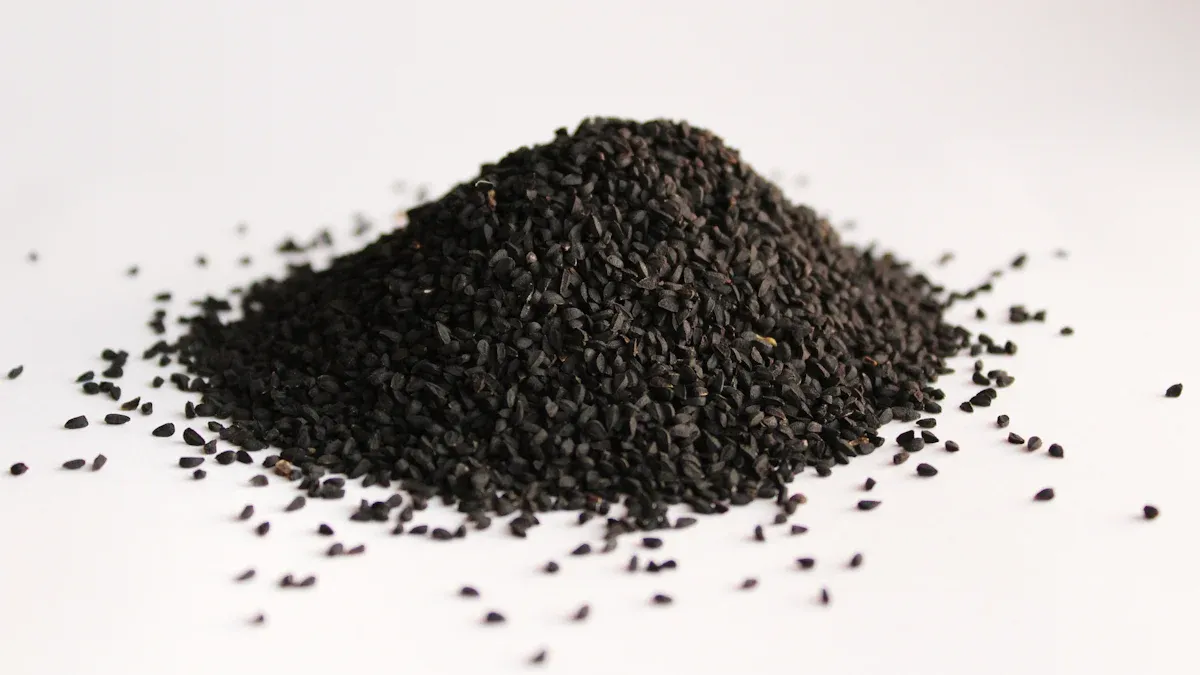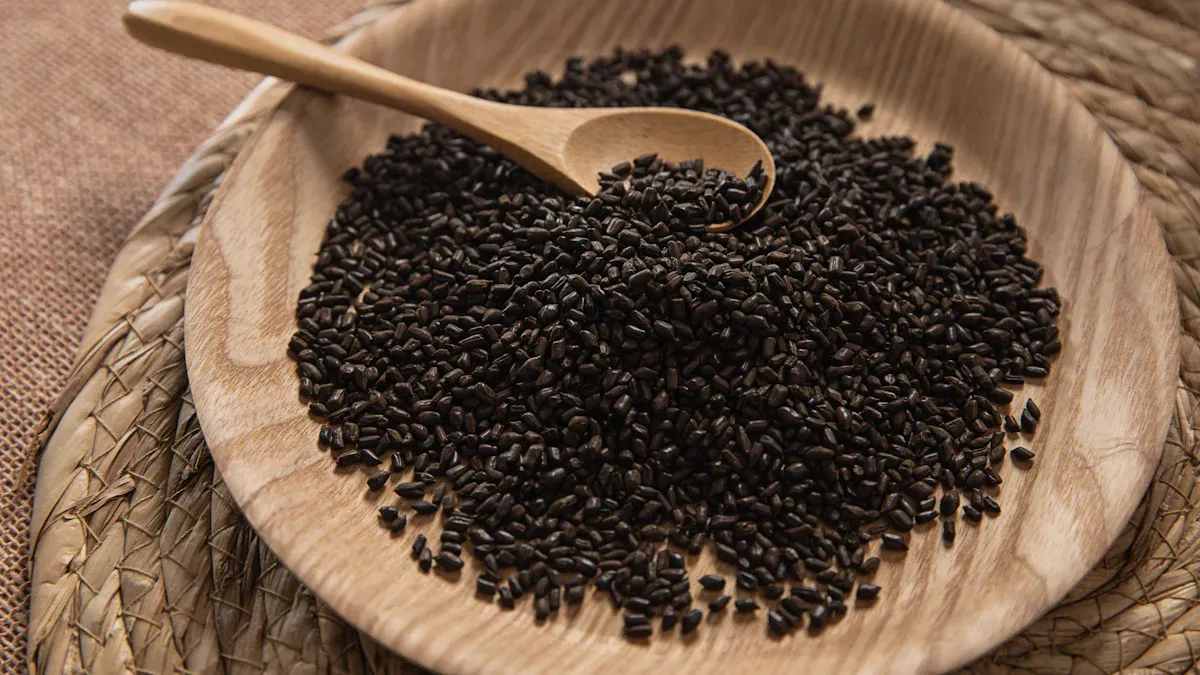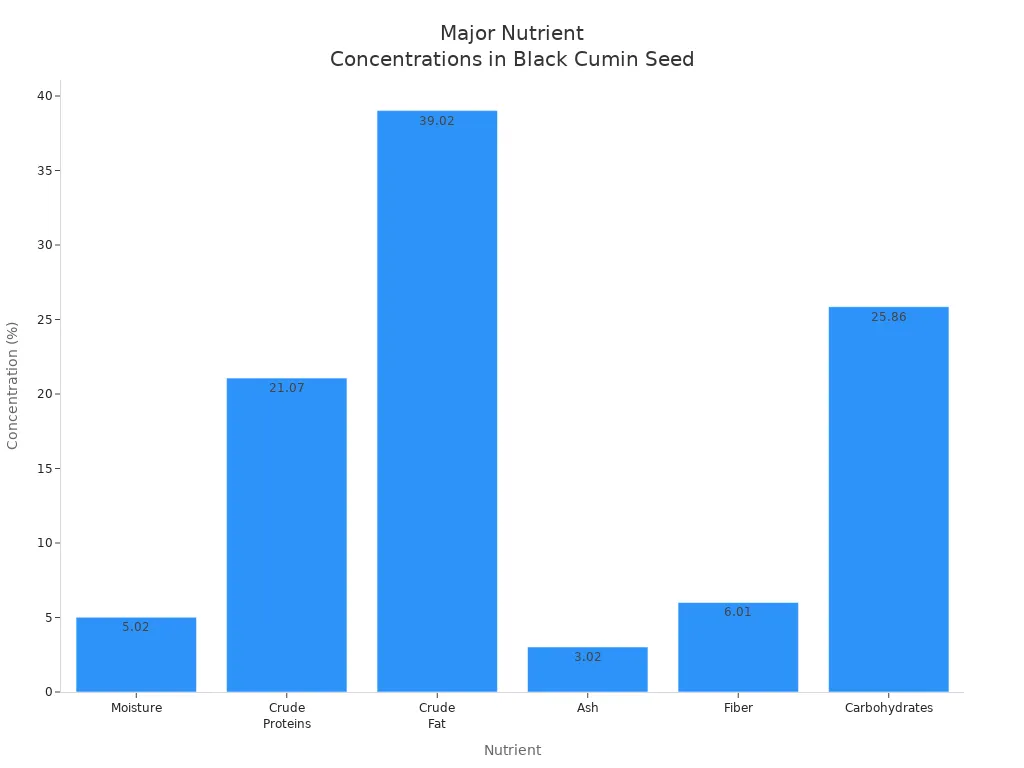
You see more people turning to black cumin seed for natural health solutions every year. Today, about 38% of consumers use black cumin seed oil as part of their wellness routine. This seed stands out for its ability to support your immune system, reduce inflammation, and help manage blood sugar. Many natural beauty products now feature black cumin seed oil, reflecting its growing reputation for skin and hair health. The market for black cumin seed oil continues to expand rapidly, showing global trust in its benefits. The table below highlights some of the most valued health effects:
Health Benefit | Description |
|---|---|
Anti-inflammatory | Reduces inflammation in the body |
Antioxidant | Protects your cells from damage |
Antibacterial | Fights harmful bacteria |
Analgesic | Helps ease pain |
Hepatoprotective | Shields your liver from harm |
Key Takeaways
Black cumin seed supports your immune system, helping reduce colds and infections.
Regular use of black cumin can lower inflammation, easing pain from conditions like arthritis.
Black cumin seeds are rich in antioxidants, protecting your cells and promoting overall health.
Incorporating black cumin into your diet can help manage cholesterol and support heart health.
Black cumin aids in blood sugar control, making it beneficial for those with diabetes.
Black Cumin Seed Overview

What Is Black Cumin Seed?
You may know black seed by many names, such as nigella sativa, black cumin seeds, or even “seeds of blessing” in Arabic. Black seed comes from the flowering plant nigella sativa, which belongs to the Ranunculaceae family. This annual plant grows up to 60 centimeters tall and displays delicate leaves and white-blue-yellowish flowers. The fruit holds deep black, rough seeds that look similar to poppy seeds. When you taste black seed, you notice a bitter, spicy, and peppery flavor with a scent like nutmeg.
People often confuse black seed with black cumin seeds from bunium bulbocastanum or with kala jeera. These seeds come from different plants and have unique nutritional values of black cumin. Black seed oil comes from the Love-in Mist flower, not from common cumin.
Many cultures value black seed for its health benefits and spiritual meaning. Ancient Egyptians used black seed in beauty rituals and even placed it in royal tombs. Greek and Islamic traditions mention black seed as a natural remedy for many health issues. In Ayurveda, you find black seed used for respiratory and digestive support.
Tip: Always check product labels to make sure you get true nigella sativa seeds, not a different type.
Nutrients in Black Cumin Seed
Black seed stands out for its rich nutritional profile. You get a mix of proteins, healthy fats, fiber, and carbohydrates. The nutritional values of black cumin include a high amount of unsaturated fatty acids, especially linoleic acid. Black seed also contains important amino acids, vitamins, and minerals.
Nutrient | Concentration (%) |
|---|---|
Moisture | 5.02 |
Crude Proteins | 21.07 |
Crude Fat | 39.02 |
Ash | 3.02 |
Fiber | 6.01 |
Carbohydrates | 25.86 |
Major Amino Acid | Glutamic acid (4.10 g/100 g protein) |
Major Volatile Compounds | Thymoquinone (21.01%), o-cymene (18.23%), β-thujene (17.22%) |
Unsaturated Fatty Acids | 85.16 |
Saturated Fatty Acids | 15.02 |
Major Fatty Acid | Linoleic acid (57.71%) |
α-tocopherol | 25.59 mg/100 g |
γ-tocopherol | 242.83 mg/100 g |
Total Polyphenols | 315.68 mg GAE/kg |

You benefit from the nutritional content of black seed, which includes antioxidants like thymoquinone and tocopherols. These compounds help protect your cells and support your overall health. When you add black seed to your diet, you gain a wide range of nutritional benefits.
Health Benefits of Black Cumin
Black cumin offers a wide range of health benefits that make it a popular choice for natural wellness. You can find black seed in many supplements and oils because of its health-promoting benefits. The health benefits of black cumin include support for your immune system, reduction of inflammation, antioxidant properties, cholesterol management, blood sugar control, allergy relief, and improvements in skin and hair health. Below, you will discover what black cumin can do for your body.
Immune Support
Black seed helps you maintain a healthy immune response. You can use black cumin to support your body’s defenses against illness. Studies show that black seed extract improves symptoms in people with asthma, which involves the immune system. Researchers found that patients who took black seed along with their regular asthma medicine had fewer symptoms and better breathing. This suggests that black cumin may help your immune system work better.
You may notice fewer colds and infections when you add black seed to your routine.
Key points:
Black seed extract improved asthma symptoms in a clinical trial.
Patients experienced less severe asthma when using black seed.
Black cumin may help your immune system respond to threats.
Anti-Inflammatory
You can use black seed for inflammation. Black cumin contains thymoquinone, which helps reduce swelling and pain. Many people choose black seed to ease joint pain and muscle aches. You may find relief from chronic conditions that involve inflammation, such as arthritis.
Black cumin lowers inflammation in your body.
You may feel less pain and stiffness after regular use.
Black seed supports recovery from injuries and strenuous activity.
Antioxidant Effects
Black cumin provides strong antioxidant properties. You protect your cells from damage when you use black seed. The seeds contain compounds like thymoquinone and tocopherols, which fight harmful free radicals. Black cumin shows higher antioxidant activity than many other seeds.
Sample Type | DPPH Activity (%) | CUPRAC (µmol TE/100 g) | TPC (mg GAE/100 g) |
|---|---|---|---|
BARI Kalozira-1 | 67.89 | N/A | N/A |
Local Kalozira | 98.09 | N/A | N/A |
BCC | N/A | 3397 | 426 |
BCM | N/A | 1514 | 92 |
Black cumin seeds have high total phenolic content.
You get better protection against cell damage.
Antioxidant effects help slow aging and support overall health.
Cholesterol & Heart Health
Black seed supports your heart and helps manage cholesterol. You can lower your risk of heart disease by adding black cumin to your diet. Studies show that black seed reduces total cholesterol, LDL cholesterol, and triglycerides. You may also see an increase in HDL cholesterol, which helps remove bad cholesterol from your arteries.
Key Findings | Description |
|---|---|
Reduction in Total Cholesterol | Black seed supplementation significantly reduced total cholesterol levels, lowering cardiovascular risk. |
Lowering LDL Cholesterol | Notable reduction in LDL cholesterol, which is beneficial for heart health. |
Increase in HDL Cholesterol | Modest increase in HDL cholesterol, aiding in the removal of LDL cholesterol from arteries. |
Triglycerides Reduction | Significant decrease in triglycerides, contributing to overall cardiovascular health. |
Black cumin contains compounds that lower cholesterol.
You support heart health and reduce cardiovascular risk.
Black seed helps keep your arteries clear and healthy.
Blood Sugar Control
You can use black seed for diabetes management. Black cumin helps regulate blood sugar levels, especially in people with type 2 diabetes. Studies show that black seed, sometimes combined with cumin, lowers fasting blood sugar and HbA1C. You may find it easier to keep your blood sugar stable when you use black seed.
Black cumin works as an adjuvant therapy for diabetes, helping you manage your condition more effectively.
Black seed helps control blood sugar spikes.
You may notice better energy and fewer cravings.
Black cumin supports healthy metabolism.
Allergy & Asthma Relief
Black cumin offers relief for allergies and asthma. You can use black seed oil to reduce symptoms like sneezing, nasal congestion, and airway inflammation. Clinical studies show that black seed oil improves symptoms in people with allergic rhinitis and asthma. Black cumin works by calming your immune system and reducing inflammation in your airways.
Study Title | Findings |
|---|---|
Clinical and experimental effects of Nigella sativa and its constituents on respiratory and allergic disorders | Demonstrated antioxidant, anti-inflammatory, and bronchodilatory properties in clinical studies for asthma relief. |
Meta-analysis of randomized controlled trials assessing the efficacy of nigella sativa supplementation for allergic rhinitis | Significant improvement in total nasal symptoms for allergic rhinitis patients using Nigella sativa compared to control. |
Black seed oil soothes allergy symptoms.
You breathe easier and feel less congested.
Black cumin helps control asthma attacks.
Skin & Hair Health
Black cumin supports healthy skin and hair. You can use black seed oil to hydrate, soothe, and nourish your skin. Black seed helps repair skin, reduce blemishes, and prevent fungal infections. You may notice a clearer complexion and fewer scars. Black seed also strengthens your hair, reduces hair loss, and soothes your scalp. You can use black seed oil to eliminate dandruff, prevent dryness, and balance scalp oil production.
Black seed hydrates and smooths your skin.
You get protection from damage and premature aging.
Black cumin promotes hair growth and reduces frizz.
Black seed supports scalp health and slows graying.
Many natural beauty products use black seed for its skin and hair benefits.
How to Use Black Seed

Culinary Uses
You find many ways to use black seed in your kitchen. People around the world add black seed to dishes as a spice. You can sprinkle whole seeds on curries, bread, or pickles. Many recipes use black seed in spice blends like garam masala, Panch Phoran, and Ethiopian Berbere. You see black seed featured in Middle Eastern breads such as naan and pita. In South Asian cuisine, black seed flavors chutneys and lentil dishes. You can also grind black seed into a powder and mix it with warm water or honey. Some people prepare tea from black seed for a soothing drink. You may add black seed to salads, roasted vegetables, or yogurt dips. These are popular ways to use black cumin seeds in daily meals.
Add black seed to baked goods and salads.
Use black seed in spice blends for curries and roasted vegetables.
Prepare black seed tea for a warm beverage.
Tip: Try black seed in bread recipes or sprinkle it on your favorite salad for extra flavor.
Black Seed Oil
You can choose black seed oil as a supplement for health benefits. Black seed oil comes from cold-pressed black seeds, which keeps important nutrients. The oil contains higher levels of essential fatty acids like linoleic and oleic acid. You get more thymoquinone from black seed oil, which supports your skin, brain, and helps reduce inflammation. Many people take black cumin seed oil by mouth or use it on their skin and hair. You find black seed oil in capsules, liquid bottles, and natural beauty products. The oil is more concentrated than whole seeds, making it a popular supplement choice.
Form of Black Cumin Seed | Appearance | Flavor | Medicinal Properties |
|---|---|---|---|
Black Cumin Seeds | Dark brown, sleek | Milder | Antibacterial, antioxidant, anti-cancer |
Black Seed Oil | Dark golden liquid | Earthy, slightly bitter | High thymoquinone, supports skin and inflammation |
Note: Always check the label to make sure you buy pure black seed oil.
Dosage Tips
You need to know the right amount when you use black seed as a supplement. Clinical guidelines suggest different dosages for each form. You can take black seed oil, powder, or extract for up to three months. The table below shows recommended amounts:
Form | Dosage | Duration |
|---|---|---|
N. sativa extract | 100 mg | Up to 3 months |
Oil | 5 mL | Up to 3 months |
Powder | 1.5 to 3 g | Up to 3 months |
You should start with a small dose and watch how your body reacts. You may want to talk with your doctor before you begin a new supplement. This helps you stay safe and get the most benefit from black seed.
Callout: Always follow dosage instructions and consult a healthcare professional before starting any new supplement.
Safety & Side Effects
Side Effects
When you use black seed, you may experience side effects. Most people tolerate black seed well in small amounts, but higher doses can cause problems. Some reported side effects include:
Muscle breakdown (rhabdomyolysis) and liver injury (hepatotoxicity) after taking 2000 mg of black seed oil daily for a month.
Allergic reactions, such as contact dermatitis, can happen when you apply black seed oil to your skin.
Severe skin reactions, including bullous lesions and erythema multiforme, have occurred in rare cases.
Age | Reaction Description | Treatment | Evidence Source |
|---|---|---|---|
28 | Allergic contact dermatitis from topical use | Pure oil of black cumin | Source |
31 | Allergic contact dermatitis from ointment | Ointment with black cumin oil | Source |
56 | Severe bullous lesions, erythema multiforme | Capsules of black cumin oil | Source |
You should know that data on black seed side effects is still limited. More research is needed to understand all possible risks.
Drug Interactions
Black seed can interact with several medications. You may face problems if you take black seed with certain drugs. Here is what you need to know:
Medication Class | Interaction Type | Potential Consequence |
|---|---|---|
Antihypertensive drugs | Pharmacokinetic | Dose adjustment of losartan may be needed. |
Cytochrome P450 substrate drugs | Pharmacodynamic | Increased risk of side effects; clinical relevance unknown. |
Anticoagulants | Pharmacodynamic | Higher risk of bleeding. |
Diabetes medications | Pharmacodynamic | Risk of low blood sugar increases. |
Dextromethorphan | Pharmacokinetic | Higher drug levels and more side effects. |
Calcium channel blockers | Pharmacokinetic | Possible interaction due to slower metabolism. |
Macrolide antibiotics | Pharmacokinetic | Possible interaction due to slower metabolism. |
Statins | Pharmacokinetic | Possible interaction due to slower metabolism. |
If you take blood thinners, diabetes medicine, or antihypertensive drugs, you should monitor for side effects. Black seed may amplify the effects of these medications. This can lead to low blood sugar, low blood pressure, or increased bleeding.
Precautions
You should avoid black seed if you belong to certain groups. Pregnant women should not use black seed oil because there are no safety studies. Babies under 13 months should not take black seed. People on anticoagulant treatment should avoid black seed oil, as it affects blood clotting. If you have dermatitis, test a small amount on your skin first. Those with upcoming surgeries should stop using black seed oil. People with immune disorders or those who take large amounts should use caution. Black seed may cause drowsiness and slow blood clotting. If you are breastfeeding, obese, or sick, talk to your doctor before using black seed.
Black seed supports whole-body health, helps lower blood pressure, and protects the gut, but you must use it safely. Some believe black seed increases fertility, but you should always check with a healthcare provider before starting any supplement.
Black seed offers many health benefits. You may use black seed to help manage cholesterol, support your immune system, and ease allergy symptoms. Recent studies show black seed oil may help with thyroid health, asthma, cognitive function, kidney health, acne, and joint pain.
Black seed can lower blood cholesterol and help prevent heart disease.
It may help with diabetes and inflammation.
You can use black seed in food or as oil, but always follow safe dosage.
Recommendation Type | Details |
|---|---|
Dosage | Most people take 1-2.5 grams of black seed oil daily. Consult a doctor for the correct dose. |
Safety Precautions | Black seed is largely safe in small doses, but may cause digestive issues and interact with medications. |
You should talk to your doctor before starting black seed, especially if you take medicine or have health concerns. Try adding black seed to your routine for a natural boost to your wellness.
FAQ
What is black seed?
Black seed comes from the Nigella sativa plant. You find it as small, black, rough seeds. People use black seed in food, supplements, and oils. You see it in many cultures for health and wellness.
What does black seed do for your health?
You get many benefits from black seed. It supports your immune system, helps lower inflammation, and protects your cells. You may notice better heart health, balanced blood sugar, and relief from allergies when you use black seed.
What is the best way to use black seed?
You can eat black seed whole, add it to recipes, or take black seed oil. Many people use black seed oil on their skin or hair. You should start with small amounts and follow dosage tips for safety.
What side effects can black seed cause?
You may experience mild digestive issues, skin reactions, or allergic responses from black seed. High doses can cause liver or muscle problems. You should talk to your doctor before using black seed, especially if you take medicine.
What should you avoid when using black seed?
You should not use black seed if you are pregnant, breastfeeding, or under 13 months old. People with blood disorders or those taking anticoagulants must avoid black seed oil. Always check with your healthcare provider before starting black seed.


